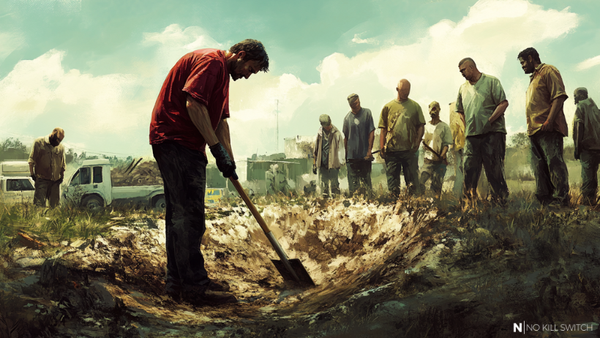Have you noticed how easy it is ...
... to sabotage an idea/initiative?
By inventing countless "special cases to consider" (of the negligible meaning) and potential weak spots (to prove that the solution ain't perfect).
By triggering more and more "what-about" side-subtopics and flooding the conversation with subjective but hardly related opinions (that do not advance the discussion but drain everyone around (emotionally) and sow the seeds of doubt).
And (at last but not least) by revisiting the closed points, spreading half-truths, understatements or simply fatalistic thinking.
Slowing the impetus of the idea can be both intentional ("torpedoing" by someone for a purpose, e.g. internal politicking) or thoughtless (instinctive, habitual or tribal - inherent to the organization's culture). The first case happens in truly pathological organizations, the second one can happen literally everywhere and it's equally destructive.
That's why I'd like to dedicate this blog post solely to the latter case.
Bias for action
Have your heard about "bias for action"?
This term was popularized in a popular book "In Search of Excellence" by Tom Peters. Bias for action (BfA) is an attitude of an individual who's not afraid to act fast - make decisions, quick judgments & risk assessments "on the go", shape impromptu solutions when needed. BfA stands in opposition to the approach where everything has to be thoroughly thought through:
- all factors have to be considered
- everyone has to be consulted
- the quasi-scientific process has to be established to make the decision (and preferably - consensus)
- etc.
What's wrong with such a thoughtful, well-ordered approach?
Well. Let's generalize things a little bit. In the wild, there are two types of decisions: permanent and non-permanent:
- for non-permanent ones (a vast majority of all!): it's better to be fast (in decision-making) than perfect (or even near to it), as the decision can be changed (/adjusted) later but no-one will give you back the time/effort you've wasted on overblown considerations
- for permanent ones: it should be optimal (taking all current conditions we're aware of) and carefully considered for possible outcomes
While solving a problem or making a decision, it's important to recognize two very different phases: diverging and converging. We start by creatively looking for options and alternatives (diverging mode), but at some point, we switch to gradually narrowing the selection down to a single "survivor" (converging). It's crucial to pick that (switching) moment correctly:
- if you do it too early, you may have no option that is objectively good enough
- but if you wait for too long, you're wasting time on considering factors/scenarios that realistically either make no difference or simply have no chance to get chosen
Effective decision-making
Coming back to effective decision-making:
- first, you need to properly classify your decision - whether it belongs to non-permanent or permanent category
- next, according to this classification, you adjust the moment of switching from diverging to the converging mode
It sounds very simple, yet many do struggle with that:
- some do treat all problems as permanent - it decreases the pressure, reduces the personal risk, helps to stay in the comfort zone - but also slows everything down to crawl ...
- there are ones who treat everything as non-permanent: that increases the dynamics of the work environment but can cause chaos, massive inefficiencies, and internal inertia (some sort of debt you need to keep paying off in the future)
- many fail in switching modes (from diverging to converging), e.g. by continuously jumping back and forth between them - this kills predictability and demotivates engaged people (because of the impression that you're running circles)
- there's a common truth that the hardest thing is ... "to start" - there are people who need a lot of "ceremony" for that, so they instinctively postpone and stall things, even if the decision is simple and straightforward
The effective execution is effective decision making. Big and small decisions. Tons of them. Every day.
The team (or in an even worse case - the full organization) which cannot process the decisions effectively is simply running circles and wasting the time - the most valuable resource the organization has.
What BfA isn't
Let me dispel some myths about BfA, just to make sure we're on the same page:
- it is not jumping onto every new initiative immediately because "why not" - learning to say "no" is very important to actually do MORE, not LESS (by "picking your battles wisely")
- BfA doesn't mean one should not prioritize work - but simple queuing doesn't work: there has to be a clear distinction e.g. between stuff that is "important" and stuff that is "urgent" (those are NOT the same!)
- BfA isn't about direct democracy or making everyone happy (by reaching consensus) - there's time for discussion, and then there's time for execution when the decision is already made, and the team commits to it wholeheartedly
- the "action" in BfA stands for such kinds of activity that do add value - e.g. endless researches and other kinds of analysis-paralysis are also some sort of "activity" (that can last without an end) but those are very far from what BfA is about
- BfA is not about raising the sense of urgency beyond the threshold of madness - an impression of being surrounded by a non-extinguishable firestorm; this would be emotionally draining and could cause accelerated burn-out in a short time
I honestly think that you won't fully appreciate the BfA mindset's pros until you learn the difference (between the biased and non-biased work environment) with your very own eyes.
Energy VS Stagnation.
Learning VS Excuses.
Empowerment VS Helplessness.
Growth VS Entropy.
I strongly advise you to look around and pay a bit more attention to how you guys make decisions on a daily basis - it may be far more important than many technical aspects we, engineers, keep freaking out about usually.








